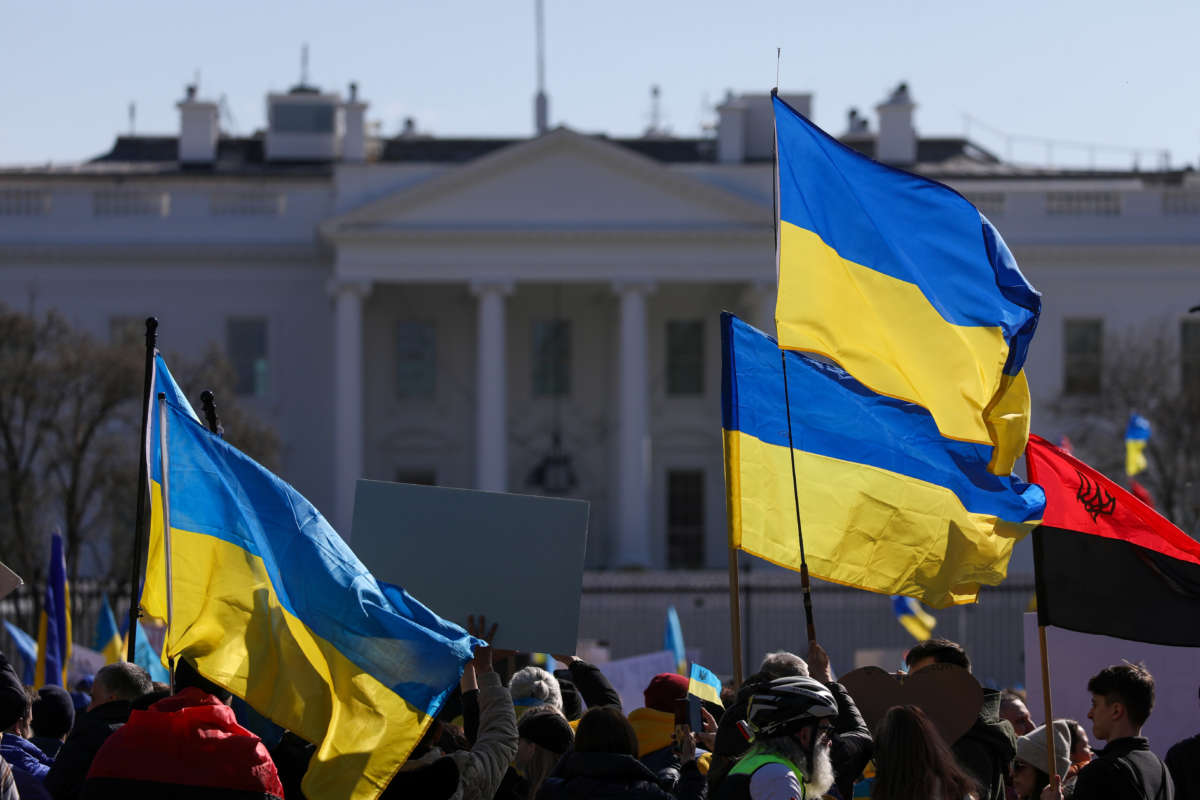
The Department of Homeland Security (DHS) is offering Ukrainians in the U.S. a form of humanitarian relief as Vladimir Putin’s invasion is ongoing.
The agency is adding Ukraine to the list of countries from which people can benefit from Temporary Protected Status (TPS) for 18 months, DHS Secretary Alejandro Mayorkas announced on Thursday. Ukrainians in the country, including undocumented immigrants and those on tourist, student or business visas could benefit. In order to benefit, people must have been residing in the U.S. since at least March 1, 2022.
“Russia’s premeditated and unprovoked attack on Ukraine has resulted in an ongoing war, senseless violence, and Ukrainians forced to seek refuge in other countries,” said Mayorkas in a statement. “In these extraordinary times, we will continue to offer our support and protection to Ukrainian nationals in the United States.”
DHS estimates that about 71,500 Ukrainians in the U.S. will benefit from the TPS designation, including the roughly 4,000 Ukrainians who are facing deportation hearings. The administration has also paused deportation flights to the region.
TPS designation is given to people from countries that have been deemed unsafe for them to return to, whether for environmental, political, or other reasons. There are currently about 400,000 people living in the U.S. under TPS. However, thanks to a Supreme Court ruling last year, residents under TPS don’t currently have a pathway to permanent residence, even though some TPS holders have been living in the U.S. for decades.
Other countries announced similar measures to grant protection to Ukrainian refugees on Thursday. The United Nations estimates that about 1 million Ukrainians have fled the country so far, and that the invasion could end up displacing 10 million Ukrainians in total.
The announcement came after lawmakers sent a letter to President Joe Biden earlier this week asking him to grant TPS status to Ukrainians. “Ukraine clearly meets the standard for TPS,” the lawmakers wrote, citing the “ongoing armed conflict.”
Both Democrats and Republicans praised the TPS designation. “The world has watched a humanitarian crisis grow as over a million Ukrainians flee their homes for safety. Thank you [Biden and Mayorkas] for heeding our call for TPS,” wrote Rep. Jamaal Bowman (D-New York) on Thursday. “Let this be a model for our treatment of refugees in need of humanitarian support in all parts of the world.”
Immigration advocates have pointed out that while Biden has been quick to move to protect Ukrainians, he hasn’t put countries like Cameroon on the list, despite the fact that advocates have been pleading with the administration to do so for months. People deported to Cameroon face violence and abuse as the West African country undergoes major political unrest.
“It is evidence of anti-blackness and discrimination toward Black immigrants,” Daniel Tse, founder of the Cameroon Advocacy Network, told The New York Times.
There has also been growing frustration among progressives and immigration advocates about the Biden administration’s abuse of Haitian asylum seekers, who the administration has been deporting en masse despite the fact that Haiti is designated as a TPS country.
Many progressives say that while Ukrainians should be welcomed to the U.S. with open arms, refugees from other countries should be extended the same protection, regardless of race. “We must respond to the crisis in Ukraine with compassion,” Rep. Ayanna Pressley (D-Massachusetts) wrote on Thursday. “That means designating Ukraine for TPS, opening our doors to refugees and providing these same protections to refugees from Africa, Middle East, Latin America, Asia, LGBTQ communities and more.”



